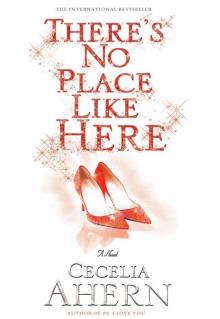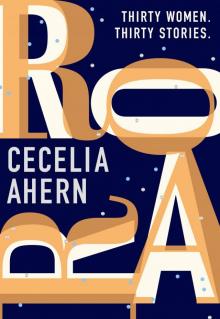- Home
- Cecelia Ahern
Roar Page 20
Roar Read online
Page 20
She brushes the dirt and sticks from her clothes and looks in the direction the music is coming from. It is happy trumpet music that instantly makes her smile. As it comes closer she can make out a nineteenth-century type of open wagon, with a band of musicians playing on top in the open air. Two coachmen wearing red military-style jackets with gold stitching sit out front. They pull the horses’ reins and the wagon comes to a halt right beside her. The music instantly stops. The carriage is stunning: red velvet panels intricately decorated in gold, with images of triumphant angels, regal lions and harps. The horses’ hair is plaited and knotted with gold ribbons woven into elegant braids. Gathered on top of the bandwagon is a six-piece band, and each musician is dressed in the same regal costume, with tall gold top hats.
‘Good day!’ a coachman calls down to her cheerily.
‘Hi,’ she replies, in awe of the spectacular sight.
The six-piece band comes complete with percussion: an enormous bass drum hangs over the side, threatening to tip the wagon over.
‘Did you have a breakdown?’ the trombone player asks.
‘My car did. I was pretty close.’
They laugh. The drummer makes the punchline rim-shot drum sound.
‘I was following a pedestrian, but I lost her when she cut across the fields.’
‘There’s no walkway through those fields,’ the trumpet player says.
‘She took her own route,’ she says, feeling the burn of jealousy.
‘Would you like to hop on with us?’ the trumpet player on the bandwagon asks.
The band members hang over the edge, looking at her, tilting the gilded wagon.
‘Where are you going?’ she asks.
‘We are going all the way, baby!’ the drummer announces, and they burst into spontaneous celebratory song.
Her eyes widen. ‘All the way? To the top?’ she asks when they’ve settled down.
‘Of course!’
‘This is perfect. It’s all I’ve ever wanted. Can you guys take me there?’ she asks.
‘Sure!’ the trombone player exclaims. ‘Jump on board!’
The woman steps up and jumps on the bandwagon, not thinking twice about leaving her car behind. The band plays continuously and she sits among the musicians, and is carried all the way along the winding road, constantly looking back to see who is behind, or following, and looking forward to see who is ahead, who they can overtake. On their journey they see the lone pedestrian she’d been following emerge from the fields. She has the same look of determination on her face, she’s focused, eyes looking straight ahead. And now she is holding two baskets.
‘Should we stop to offer her a ride?’ the drummer asks. ‘She’s in the middle of nowhere here.’
She wants to say no but this bandwagon has been so generous to carry her all the way. The coachmen pull the reins and the bandwagon slows.
It’s as though the woman hasn’t heard the heavy clopping of hooves on the ground, and the six-piece band playing cheerful music all the way behind her.
‘Hello there!’ the woman calls down.
‘Oh, hello again!’ the pedestrian says, grinning and holding her hand over her eyes to shield the sunlight. ‘What a beautiful bandwagon!’ Her eyes scan the ornate gilded embellishments along the side, and the woman on the bandwagon feels a wonderful smug feeling glowing inside.
‘Would you like to climb aboard?’ the woman asks. ‘We’re going straight to the top!’
‘Oh, how kind,’ she says. ‘But if you don’t mind, I really am enjoying the walk,’ she repeats. ‘And I have some things to do.’
The woman is now really put out by this response; she has given her two opportunities to join her and has been refused twice. The pedestrian’s boots are dirty from the walk through the field and as soon as the sun goes down there is no doubt she will be cold. While the band swap pleasantries, the woman sits down and folds her arms huffily, deciding then and there that if the pedestrian won’t come with her for the journey, she’ll do it herself and she’ll do everything she can to slow her down.
The coachmen signal to the horses with the reins and the bandwagon moves on. She feels a deep satisfaction as they pass the pedestrian by, but it’s spoiled by the fact that she doesn’t seem to care about passing up on this chance for company and convenience, she is lost in her own world, doing her own thing, swinging two mysterious baskets by her side. The woman watches until she’s a speck in the distance.
Finally, after a long journey the woman and the bandwagon arrive at a pretty little town. The band plays so loudly it attracts everybody’s attention. The villagers run out of their shops and homes to surround the wagon on its way to the town square. The journey is bumpy as they roll over the cobblestones and children run alongside cheering while the band, in their element, play their greatest hits. They are guided by bunting which lines the street and, when they arrive at the town square, a mayor wearing his chain of office is standing on a makeshift stage, awaiting their arrival.
‘Welcome!’ he booms, stooping under the weight of the thick gold chain with the town crest hanging over his chest. ‘You’ve made it,’ he says. ‘The second woman to reach us this hour. Do you know where you are?’
‘Not exactly,’ she says excitedly, and then frowns at the mention that she is the second woman. ‘Is this as far as I can go?’ she asks hopefully. ‘The very top?’
‘Not exactly … why don’t you honour us by unveiling the plaque and you’ll see.’
She pulls the cord and a little red velvet curtain opens to reveal their location: Almost As Far As You Can Go. Everyone cheers.
‘This is a great achievement indeed,’ the mayor booms and the band play along in celebration.
She gives them a tight smile, attempting to show gratitude, but in truth she is a little disappointed by the empty feeling of reaching this point. Almost is good, but not good enough. She needs to climb higher, but she isn’t certain that the bandwagon is going to take her there. The horses are tired, the band need a break, the instruments need fine-tuning, the carriage needs maintenance and they all plan to stop for the night and rest. She does not want to settle here. She feels they have taken her as far as they can go.
‘I’m very grateful for the welcome,’ she tells the mayor. ‘But unfortunately I can’t stay. Can you tell me how I can get up to the top of that mountain?’
‘I suggest you go in that direction,’ the mayor says.
She follows the direction he is pointing and spots the same lone pedestrian walking away from the town and toward the steep mountain. She frowns, annoyed that the woman somehow managed to get here first. How?
She considers running to catch up with the woman but her two refusals of company have put her off. She could follow her though. That is her plan until she hears a new song she has never heard before, travelling away from her. She can’t believe her luck when a new bandwagon exits a narrow laneway and joins the road leading from the town. This one is a blush-coloured velvet and the embellishments are silver. The two coachwomen holding the reins are dressed in blush-pink, with pretty silver embellishments on their grand uniforms. The band that stand at the top of the bandwagon wear similar uniforms with quirky silver hats.
She needs no invitation this time, she doesn’t even bother calling them to stop and she races to catch up and she leaps onboard. Sitting on the back of the bandwagon, her legs swinging, she waves goodbye to Almost There.
As they drive along the country road that leaves the village and brings them to the mountain roads they pass the lone pedestrian, who is carrying two even larger baskets in her hands now, humming her own tune. She doesn’t notice the woman sitting on the back, swinging her legs. The woman stiffens when she sees her, and before she even has a chance to think it through properly, she pulls the lock open on the back of the bandwagon, pushes open the door and watches as the contents tumble out. The pedestrian jumps off the road to avoid being knocked over. She drops her baskets and the contents scatter around her. The
woman concentrates hard to see what has fallen out but they are moving away too quickly and she can’t see. The woman is shocked by her own vindictive actions at first and her hands fly to her mouth, but as she watches the pedestrian stumbling over the obstacles and scrambling to gather her belongings, she starts laughing.
The coachwomen and musicians on the bandwagon don’t notice the added load of the woman at the back, or the load they lost from storage. She eavesdrops on the musicians’ lively conversations, absorbs their passion and talent, gobbles up their views, knowledge and ideologies as she is carried higher and higher up the mountainside.
As darkness falls, she is weary after a long day of travelling and so she climbs inside the storage area, curls up and is lulled to sleep by the gentle swaying of the bandwagon, and the soothing sound of the saxophone.
Banging on the roof causes her to awake with a start, feeling panicked, forgetting where she is. She sits up, looks around the pink and silver box, taking a moment to orientate herself, and suddenly notices the horses’ hooves are quiet. The bandwagon has stopped. It sways gently as the footsteps above her bang as the musicians disembark from the wagon. Very soon she will be revealed and they will be angry about the loss of their sleeping bags and equipment. She crawls quietly to the door and slowly pushes it open. It’s dark outside, the band members and coachwomen are out of sight, gathered together discussing where to set up camp overnight.
She slips out and steals away in the opposite direction, disappearing into the darkness. It’s a still night, balmy and calm, the sky is clear and the stars seem so low around her that she could reach out to touch them. She wraps her cashmere cardigan around her tightly, feeling cosy and content, and is long gone before the band even notice their belongings are missing. She senses that she is close to the top; it is more remote than ever, the air is thinner and she finds it harder to breathe. She can see the lights of the distant village, shining in the moonlight, and after a short walk from the bandwagon, across country, she steps out onto the road that leads to the town on the top of the mountain.
As she makes her way towards the town, a villager spots her and calls to some others. A friendly crowd excitedly welcomes her and guides her to the town square, and there she is greeted by the mountaintop mayor.
‘Congratulations,’ the mayor welcomes her. ‘Would you like to do the honours?’ he asks.
She looks to where the velvet curtain should be covering the plaque but it’s already open.
‘Oops,’ the mayor says and quickly draws the curtain. ‘Someone arrived just before you.’
The wind slightly taken out of her sails, the woman pulls the string and the small velvet curtains open to reveal The Highest Point. She feels tears prick her eyes with delight, she has made it, but she is absolutely exhausted.
‘We have a wonderful community of accomplished people, their talents are extraordinary, their knowledge and focus is second to none,’ the mayor explains. ‘We look forward to seeing the fruits of your labour, and learning what it is that helped you to reach us here at the top. As I tell all of our new arrivals, the journey to get here was no doubt hard, but staying here will be the continuation of your immense hard work.’ He lowers his voice and fixes her with a stern eye. ‘Though it must be said that living among us here at the top carries a caveat; despite the natural abilities of those who have lived among us, unfortunately for some, their idleness drove them on, as in’ – he turns to point out a dark metal gate in the distance, leading to a winding road – ‘they embarked on the journey of the downward spiral. Saying goodbye to those is always a sad day for us, but I’m sure you won’t follow their path and that your diligence can prevail.’
Very quickly the crowd disperses, returning to their homes and their workplaces to ponder and work on the things that helped them reach The Highest Point. The woman lingers, unsure, feeling out of place, but happy to look down and see everything and everyone beneath her. For the first time in a long time she thinks about her abandoned car, the place she had left behind and the traffic she had instructed the bandwagon to dangerously overtake on the journey here. She needn’t worry about them, there will be no going back. There will be no meeting the same people on the way down that she overtook, tricked, tripped and ignored on the way up.
As she is recalling her journey, her eyes fall upon three baskets not far from her. She follows the baskets and sees the lone pedestrian ahead of her, at the edge of the summit, also surveying the grand view and the journey she has undertaken. Her clothes are torn and dirty. She is breathless and sweating but still smiling. The woman scowls, unable to believe that this lone independent woman, despite all the obstacles, and help she refused, got here first.
‘Oh hello again,’ the pedestrian calls out to her, still polite, though her eyes are hardened, wary, since they last met. ‘Isn’t it beautiful up here?’
She’s irritated by this pedestrian, she can’t help it. ‘Are you planning on staying here?’
‘I don’t know,’ the other replies, looking out to the distance. ‘I’ll see.’
This vague aloofness makes her snap. She can’t help herself. ‘Do you ever have any plans at all?’
The lone pedestrian fixes her with a firm look that rattles the woman. The vagueness is no longer there.
‘You and I may have reached the same place, but we are not alike. I wasn’t aiming for here,’ the pedestrian replies. ‘I was just enjoying what I was doing, was doing it very well, and it got me here. You, on the other hand, weren’t doing anything in particular other than trying to get here. Now that I’m here, I can continue what I was doing. Now that you’re here, what do you do?’
The lone pedestrian doesn’t even wait for an answer before leaving her alone on the edge of the mountain. Feeling stung, the woman lifts her chin, but the air is thin and she’s finding it hard to breathe.
She was on her way to work. It was 7 a.m. – early, but she liked early and she liked her job. She was happy. But she was not smiling. Because not-smiling happens sometimes.
‘Adult round-trip, please,’ she said sliding her money through the gap in the glass to the ticket seller.
He looked up at her and smiled. ‘Cheer up, love,’ he said, taking the money.
‘Excuse me?’
‘Cheer up!’ he laughed. ‘It can’t be that bad.’
She looked around to see if anybody had heard. The man behind her was wearing earphones and was focusing on his wallet, but he wasn’t smiling either.
‘Um … okay,’ she said, confused. She frowned, then stopped herself, taking her ticket and stepping away. She watched as the non-smiling man who was next in line placed his money down on the counter. The ticket seller said nothing to him. They exchanged the money for the ticket without any demands as to how he should fix his non-smiling face.
She waited on the platform, feeling a little confused as to how to control her face, unsettled by the fact that she had essentially been monitored and directed to do so by a stranger. She wasn’t unhappy. Why had a stranger asked her to smile? She studied her reflection in the window of the train station, and analysed herself in a thousand different ways. No, she did not look miserable. She looked normal, just like all the other men and women who stood on the platform with her.
Once off the train, she stopped at a shop on her way to the office to buy a chocolate bar for lunch. She was in the mood for a treat today.
‘Smile, love, it might never happen,’ the shopkeeper said with a wink.
Again she paused. ‘Excuse me?’
‘It might never happen!’ he repeated, chuckling.
‘What might never happen?’
‘Ah it’s just an expression!’ he nodded.
‘I’m not unhappy,’ she told him, confused.
‘Okay, okay,’ he raised his hands. ‘Whatever you say.’ He nodded over her shoulder to the customer behind her to dismiss her, all business again, and she stepped to the side. She studied the next customer, an older man. He was not smiling either. Th
ey didn’t talk. He paid for and left with his newspaper. It was a fast and uncomplicated exchange. The man was not forced to analyse himself or his face by a stranger in a shop.
‘Can I help you?’ the shop owner asked, noticing her staring.
‘Why didn’t you tell him to cheer up?’
‘Who?’
‘Him?’
He looked at the door, then frowned as though she was crazy. ‘Look, a pretty girl like you shouldn’t look so …’ He made a cartoon grumpy face.
‘But I wasn’t making that face,’ she said.
‘Yes you were, I saw you.’
‘And it bothers you because I’m pretty?’
‘Me?’ he got defensive. ‘Makes no difference to me.’
‘Do you like asking strangers to smile on demand?’ she asked.
‘Ah, go on,’ he nodded at the door for her to leave, not liking her attitude, ‘we’re finished here.’
Fuming, she left the shop.
The following day she returned to the train station. She bought her ticket. The ticket seller looked up at her.
She donned her comedy glasses and moustache, and stuck a party blower in her mouth. She blew it so hard, the horn blasted, the foil uncoiled itself and smacked against the glass that separated them. She gave him jazz hands.
He sat back in his chair and folded his arms, not at all impressed.
Back at the shop, she stood in line. When she reached the till, the shopkeeper recognized her.
Red lipstick in hand, she took her time drawing an enormous and messy clown-like smile, which reached the dimples in her cheeks. She placed a red clown nose over her own, pressed play on her iPod and circus music began. She proceeded to dance around his shop to the clown music while he and the customers watched. She picked up three oranges and began juggling.
Finally she finished with a ‘Ta-da!’

 The Time of My Life
The Time of My Life Lyrebird
Lyrebird Girl in the Mirror
Girl in the Mirror Perfect
Perfect One Hundred Names
One Hundred Names PS, I Love You
PS, I Love You Flawed
Flawed The Book of Tomorrow
The Book of Tomorrow Love, Rosie
Love, Rosie A Place Called Here
A Place Called Here How to Fall in Love
How to Fall in Love The Marble Collector
The Marble Collector Postscript
Postscript The Gift
The Gift Thanks for the Memories
Thanks for the Memories If You Could See Me Now
If You Could See Me Now Roar
Roar Cecelia Ahern 2-book Bundle
Cecelia Ahern 2-book Bundle Girl in the Mirror: Two Stories
Girl in the Mirror: Two Stories PS, I Love You: A Novel
PS, I Love You: A Novel Cecelia Ahern Short Stories
Cecelia Ahern Short Stories There’s No Place Like Here
There’s No Place Like Here